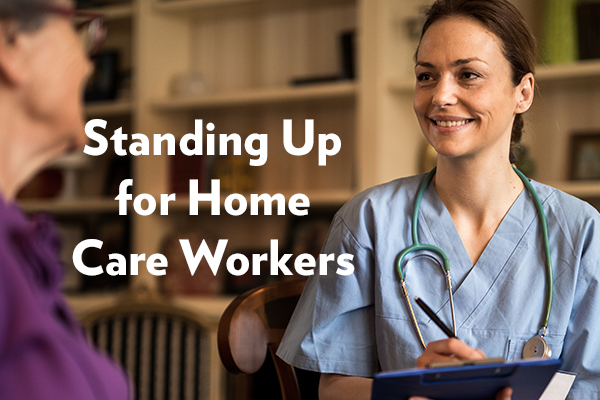Memo

Protecting Home Care Workers from Gov. Wolf’s Invasive Executive Order
In February 2015, Gov. Wolf issued an executive order allowing unions to force representation on 20,000 home care workers. The Commonwealth Court invalidated the executive order following a lawsuit from home care workers. However, the state Supreme Court recently reversed the decision, authorizing the government to divert up to $8 million in Medicaid and state health care funds away from vulnerable Pennsylvanians to an outside organization.
Legislative action must correct this illegal executive overreach into the daily lives of home care workers who, by a vast majority, did not authorize representation.
Gov. Wolf’s order harms home care workers and participants
Home care (or “direct care”) workers provide in-home care to the elderly or individuals with disabilities (“participants”), often family members or friends with whom they negotiate personalized employment terms. Home care workers and participants immediately filed a lawsuit in 2015 to protect their personal arrangements from government intrusion.
- Within weeks of the executive order, the United Home Care Workers of Pennsylvania (UHCW), a joint-project of AFSCME and SEIU, received the private contact information of 20,000 home care workers and conducted an election.
- Requiring only a majority of cast ballots, UHCW became the exclusive representative despite receiving support from just 13 percent of eligible workers.
- Following a preliminary injunction, the Commonwealth Court invalidated portions of the executive order as de facto legislation that exceeded Gov. Wolf’s constitutional authority.
- While Gov. Wolf appealed the ruling, he allocated $1.25 million for an “orientation” program forcing home care workers to meet with union representatives. The program was suspended as a violation of the injunction.
- In August 2018, the state Supreme Court reversed the Commonwealth Court’s decision and authorized the executive order.
- UHCW can now negotiate employment terms for all 20,000 home care workers, including provisions to send a percentage of their salaries to UHCW. As a result, UHCW could receive approximately $8 million annually from these workers.
- If workers want different representation, they must wait one year and then demonstrate 10 percent of home care workers want a change to trigger an election for new representation or decertification.
- This stealth unionization could hamper up to 78,000 home care participants from directing their own care.
Gov. Wolf’s order violates the Pennsylvania Constitution
Pennsylvania governors cannot create law through executive order or issue orders conflicting with existing statutes. Gov. Wolf’s executive order constitutes an overreach of authority.
- The General Assembly has already prohibited home care workers from unionizing. The Pennsylvania Labor Relations Act (PLRA) excludes individuals “in the domestic service of any person in the home of such person” from organizing.
- Directly contradicting PLRA, these workers will be represented by a union-affiliated organization negotiating employment terms, including dues deduction, with the governor.
- Gov. Wolf’s order conflicts with home care laws allowing home care recipients to direct their own care. It additionally alters the rules and procedures of the home care programs established under the General Assembly’s authority.
- The order further overrides the protections state labor laws provide to employees who do not wish to be represented by a union.
The Centers for Medicare and Medicaid Services will soon release a final determination on a rule change prohibiting Medicaid funds from being sent to a representational organization. This means deducting fees from Pennsylvania home care workers, aside from those caring for the roughly 1,500 participants paid through Pennsylvania’s Act 150 program, will conflict with federal ruling.
Recent government union political spending
- UHCW-affiliated unions SEIU and AFSCME donated $131,000 to the 2015 campaigns of three newly elected state Supreme Court Justices, and gave an additional $25,000 to another justice’s 2017 retention campaign.
- SEIU and AFSCME have contributed over $4 million to Gov. Wolf since 2013, half of his total government union donations.
A legislative solution
The General Assembly must enact legislation to supersede portions of the executive order, ending the Governor’s attempt to ignore the rule of law.
- Legislation can immediately declare portions of the executive order invalid as executive overreach in violation of Pennsylvania’s constitution and the PLRA.
- Concerns with home care worker pay can be better addressed through Medicaid work requirement reforms designed to steward limited resourced and help healthy individuals escape poverty.